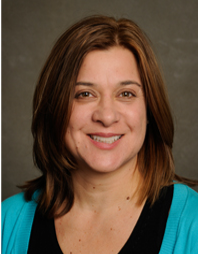Sharing What We Have Learned: Healthy City Collaborative
Sharing What We Have Learned is sponsored by the Office of Community Engagement and Neighborhood Health Partnerships, Healthy City Collaborative, and the Office of Health Literacy, Prevention, and Engagement. We are pleased to highlight research and community engagement activities of UIC researchers. Each month we feature a researcher and important findings from their work. This information is shared in a ready-to-use format suitable for widespread distribution. If you would like more information about our efforts to share what we have learned, visit our website at http://oceanhp.uic.edu or email sabrina1@uic.edu.
Our Peers: Empowerment and Navigational Support – A peer navigator intervention for people with disabilities
Susan Magasi, PhD
Associate Professor of occupational therapy and disability studies, College of Applied Health Sciences
Member of the University of Illinois Cancer Center
Introduction
The 61 million Americans with disabilities are an unrecognized health disparities population. People with disabilities face significant physical and structural barriers to health and health care, such as inaccessible clinic spaces and examination equipment and a broken health care system ill-equipped to address their needs. Health care providers are often inadequately trained to work with people with disabilities, which can lead to delayed, incomplete and poor-quality care. Making matters worse, many people with disabilities also experience disparities based on their race, ethnicity and socioeconomic status. As a result, people with disabilities vulnerable to social and economic conditions that negatively impact health, such as high rates of unemployment, food and housing insecurity, and poverty. In spite of these compelling needs, people with disabilities are largely absent from clinical, research and public health equity agendas. There is a critical need for interventions aimed at helping people with disabilities get the quality health care they deserve.
Methodology
Using a participatory research approach that brought together academic researchers, disability health policy experts, and clinical collaborators, we created Our Peers: Empowerment and Navigational Support. OP-ENS is a 12-month community-based intervention that pairs people with physical disabilities with peer navigators to help them break down barriers to care. For the purpose of this project, the peer navigators are themselves people with disabilities who have been trained in the structured OP-ENS process of goal setting, barrier identification, asset mapping and action planning to help people meet their health goals. We evaluated OP-ENS in a sample of 101 people using a randomized control design to determine feasibility, acceptability and preliminary outcomes.
Conclusion
Preliminary findings show that OP-ENS is feasible to implement and highly acceptable to both peer health navigators delivering the intervention and people with disabilities receiving it. Participants created and met a broad range of goals related to patient-provider communication, access to disability services and durable medical equipment, transportation, housing, food access, and peer support. Peer navigators also provided important emotional and informational support, which were particularly impactful for people experiencing social isolation in the early phases of the COVID pandemic. One positive but unexpected outcome was that several peer navigators were able to transition to full-time employment based in part on the work experience they gained as part of OP-ENS. Based on OP-ENS’s promising outcomes, we have received additional funding to adapt the OP-ENS intervention for remote delivery using a smartphone app.
About Our Researcher
Susan Magasi partners with the disability community to produce action-oriented research that supports the shared goal of health and participation equity for all people with disabilities. She has over a decade of continuous funding to develop, implement and evaluate peer support interventions to improve access to health and cancer care for people with disabilities. Given her passion for developing the next generation of disability researchers, she mentors students while creating opportunities to build research capacity within the grassroots disability community.

